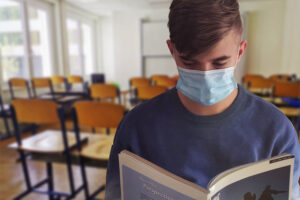Four out of every ten Basques bet on their adoption more restrictions to face the coronavirus pandemic and 45% due to home confinement, compared to 52% who reject this last measure. Furthermore, a 71% of the population believe that it is “unlikely or not at all likely” to be infected, and 42% believe that in 2022 it will be possible to live in a similar way to before the incidence of covid-19.
These are the main conclusions of the study by the Basque Government’s Sociological Prospecting Office, entitled ‘Citizen Perceptions of the Pandemic, carried out between the 27th and 30th of last January among 900 people.
The study highlights that 61% of Basques believe that most of the population is reacting with civility and solidarity with the measures adopted against the pandemic, while another 34% consider that it is being “not very civic and unsupportive.”
40% consider that, given the current evolution of the pandemic, more restrictive measures should be imposed, 24% believe that current measures are adequate and 28% that measures other than those adopted so far should be adopted. Only 2% believe that the measures should be less restrictive. Regarding the possibility of imposing a new home confinement 45% bet on it and 52% reject it.
MOBILITY BETWEEN MUNICIPALITIES
More than half of the respondents, 55% believe that the current norm that prohibits travel between municipalities in the Basque Country is the most appropriate24% that they should only be prohibited in localities where the situation is worse, and 16% that mobility between them should not be limited.
A higher percentage, 61% consider that the restriction of meetings In a group to a maximum of 4 people is adequate, 30% think that meetings between people who do not live together should be prohibited and 6% on the contrary, that group meetings should not be limited.
CLOSING OF THE HOSTELS
On the closure of hospitality establishments, 46% agree with the measure Currently in force to close establishments in the municipalities where the situation is worse, 27% believe that the hotel industry should not be closed in any municipality, and 23% that it should be closed in all municipalities.
Regarding the limitation to perform group sport, the majority opinion (42%) agrees with the current regulation, which prohibits group sport in the municipalities where the situation is worse, 35% believe that it should be prohibited in all municipalities, and 19% that it should not be prohibited in any municipality.
RISK OF CONTAGE
The survey confirms that the “high concern” about the pandemic, specific, an 89% declare to be very or quite concerned about the expansion of the coronavirus. However, fewer people are very or quite concerned about becoming ill themselves (78%) than those who are concerned about the fact that other people in their immediate environment may become ill (93%).
The activities that are perceived as having the highest risk for contracting coronavirus are the meetings in private homes with people who are not living together (89% believe they are at high or high risk), traveling by public transport (85%) and eating or drinking inside bars or restaurants (80%).
It is perceived as slightly less dangerous work in a closed space with other people (77%), attend class in a closed space with other people (73%) and, finally, go to stores or shopping centers (73%).
However, 71% of the population considers that, taking into account their activities, their personal contacts and the prevention measures they adopt, it is “little or not at all likely” that they will be infected with coronavirus. 7% believe that it is “very likely” and 18% that it is “quite likely”.
POST-COVID SOCIETY
Respondents have also given their opinion on expectations to return to live similar to before of the pandemic. Most believe it will be in 2022 (42%) and 26% believe that it will be in 2023 or later. 13% of the population expects it to be at the end of this year and only 6% in the summer of this year. 8% believe that they will never live in a similar way to before the appearance of covid-19.
The majority of the population does not believe that Basque society will change in terms of solidarity and equality between men and women, but it does in terms of social inequalities, thus 74% believe that, after the pandemic, inequalities will be greater.
VACCINATION
Nowadays, 75% of the population states that when offered the possibility of getting vaccinated, will go to inoculate the antidote. 19% are still not sure what they will do and only 5% say they will not be vaccinated.
The main reasons for not wanting to be vaccinated are that they would prefer to wait longer (mentioned by 41% of those who say they will not be vaccinated), and that they believe that the vaccine is not safe (30%).
Among those who have doubts about whether to get vaccinated or not, the following factors would contribute to deciding in favor of vaccination: the fact that they were seen in a situation of great risk of contagion (42%), that other people in their environment did not have adverse effects after being vaccinated (33%), that their GP recommended it (25%) and that vaccination was essential to travel to other countries (16%).
ECONOMIC CONSEQUENCES
On the economic consequences, 43% say they are very worried and another 35% quite concerned about the consequences that the crisis may have on their family finances. This concern is greater when asked about the possible consequences for the economy of the Basque Country, specifically, 58% are very concerned and 37% quite.
36% of the population indicates that their economic situation has worsened with the pandemic, 14% say a lot and 22% somewhat. 24% foresee that their situation will have worsened within a year, 52% believe that it will not change and 19% that it will have improved.
On the other hand, the consequences of the pandemic in the schooling of their children are relatively less concerned about the consequences of the pandemic, 44% say that a lot and 33% quite. In the case of the consequences for mental or emotional health, the concern is high for 36%, quite a lot for 38 and, in the case of problems of family conciliation at home, these variations are 27% and 28%.
60% of citizens say they are more concerned about consequences on health, 17% due to the consequences on the economy and employment and 23% spontaneously say that they are equally concerned about both.
The Basque population values their personal emotional situation with 6.1 points, on a scale from 0 to 10, in which 0 means that they are totally depressed and 10 totally animated. On the other hand, 14% of Basque citizens believe that “the worst” of the pandemic “has already passed”, 34% believe that “the worst moment” is being lived, and 45% that the worst is “yet to come. get”.
SANITARY SYSTEM
On the other hand, 74% of citizens grant a score between 7 and 10 to health care that Osakidetza is giving to people sick with Covid-19, which is valued with 7.6 points on average. 46% of citizens believe that the response of the Basque health system to the pandemic is being better than that of other autonomous communities, 41% believe that it is the same and only 2% that it is worse.
Regarding the clarity of the information and recommendations of the health authorities, 40% of the population gives a score between 7 and 10 points. 75% of Basques approve of the actions of the Basque Government in this crisis, with an average assessment of 5.7 out of 10 points, while in the case of the State Government, it is valued with 4.4 points and in the case of the EU with 4.9.











